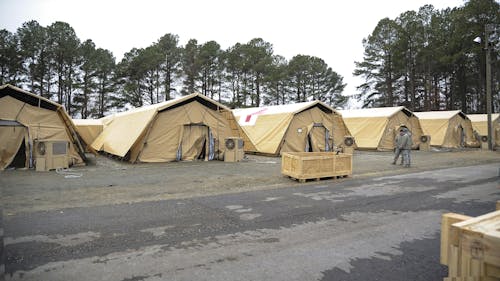Rutgers-led study analyzes effect of IED injuries on soldiers’ fertility

A recent study led by University researchers found that increased usage of improvised explosive devices (IEDs) in warfare causes traumatic injuries to soldiers, which affects their ability to bear children in the future.
Shane Kronstedt, a Rutgers New Jersey Medical School alum, former U.S. Navy SEAL and lead researcher of the study, said his team analyzed data from the Department of Defense Trauma Registry documenting approximately 30,000 patients' urological injuries.
The data, ranging from 2007 to 2020, found that among the 25,897 adult patients, the most frequently injured organs were the scrotum, testes, penis and kidneys.
On the battlefield, there are a small number of specialized surgeons available, and therefore, a general surgeon, rather than a urologist, provides treatment for these specific injuries, Kronstedt said.
He said there has been an increase in the amount of foot patrolling by soldiers in combat zones, which has caused an increased likelihood of soldiers stepping on explosives and incurring genitalia injuries.
"When an explosive goes off, it penetrates up, and the blast blows off people's legs and continues to shoot up the middle (of the body) toward the genitalia, abdomen, etcetera," he said.
Kronstedt said such explosives include IEDs, bombs often planted on the ground, which can be triggered remotely or when pressure is applied near the explosive area.
He said that while soldiers are required to wear protective gear for their upper bodies, having protective lower body armor is not mandated, leaving the genital region more vulnerable to damage from explosives like IEDs.
Such damage to the genital region can lead to issues like decreased fertility — one of the reasons why many soldiers may engage in sperm banking prior to deployment.
"We have seen in some studies that a lot of people have a lot of fertility issues, even people that do not have any overt injuries," he said. "Just being exposed to a blast, the pressure wave can create damage and changes once you experience that trauma. Over time, they have seen, microscopically, changes to the tissue of the testicles, so these servicemembers can become sterile from the blast itself."
Kronstedt said these fertility issues, while not directly life-threatening, can have serious repercussions for soldiers' mental health. Similar to conditions like post-traumatic stress disorder, these issues are often underreported.
"When people get affected (by) this, it's very devastating. It has a very devastating effect on them, their partner, as well as their mental health, their reproductive health and sexual health," he said.
Kronstedt said that the medical field has made advances in gender-affirming surgeries like phalloplasties, which can help penile construction and reconstruction procedures for affected soldiers. These surgeries can help regain genitalia function and full sensation.
He said that a large number of veterans do not utilize programs like Veteran Affairs that can provide the proper resources and coverage to have these lengthy, multi-step procedures completed and finished.
Kronstedt also said other factors like prosthetics, psychiatric care, fertility and sexual function must be considered following these medical procedures.
"There needs to be a multidisciplinary approach, and I think there needs to be some thought in having the resources available to manage that," he said.



